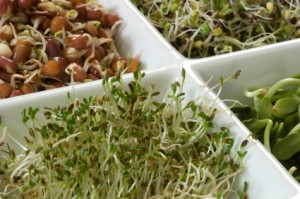The last thing you wanted to read about this week was another
e. coli outbreak. Luckily, this one happened two summers ago (2011), but we’re writing about it now because
e. coli outbreaks are a real danger. In the
2011 German outbreak, definitively linked to unclean sprouts, 3,000 people got sick (some of them got sick enough to be put in quarantine) and 29 died.

The likelihood of
e. coli coming from your homegrown sprouts is fairly low. If you are diligent at thoroughly washing the sprouting dish after each use, and washing your hands each time you handle the sprouts, you are well ahead of the game. But, because sprouts are a fresh, raw product, you should know that infection is possible, even if it is unlikely.
The first, and probably best, tip is this: if your sprouts look slimy, or
smell weird – don’t eat them! (That means you, Dad. No rinsing it off and pretending it’s ok.) There is one exception; broccoli sprouts produce
sulfaraphane which is thought to have anti-cancer properties. Sulfaraphane smells like—you guessed it—sulfur and that’s normal for broccoli sprouts.

Follow these seven easy steps and get delicious, fresh, clean sprouts – every time!
-
Wash your hands every time you handle the seeds or sprouts – do it right, don’t give it the quick rinse. A bit of hand sanitizer after a good wash is not a bad idea either.
-
After soaking your seeds, skim off anything floating on the surface. Research has shown that these “floaters” may be more likely to grow bacteria.
-
Rinse your seeds/sprouts. No matter what sprouting method you use, rinse your seeds/sprouts frequently with clean water. At least twice a day is recommend, 3 to 4 times a day is better. Keeping the seeds/sprouts moist allows them to germinate, and rinsing them frequently helps keep bacteria from growing.
-
Completely drain your seeds/sprouts after each rinse. Rinsing is key to safety. Standing water can lead to mold and bacteria so get rid of the excess.
- As sprouts develop use a clean fork to break up the sprouts before rinsing, as you rinse allow any seed hulls or other “floaters” to rinse out.
- After your sprouts have fully developed do a final rinse in a clean bowl. Use a clean fork, or your clean hands, to remove any final floaters or other non-sprout material.
-
Remove excess water. Dry sprouts with a clean paper towel or use a fine mesh salad spinner.
-
Wash your sprouting dish after each use and before you start sprouting.
You can store sprouts in a clean bag or other sealed container in the refrigerator, but… sprouts are more delicious and nutritious when they’re fresh. Don’t wait for more than a couple of days to enjoy the fruits of your sprouting labor!
Here’s something you probably didn’t know. Sometimes you may need to clean the seeds themselves. If you’re purchasing commercial sprouting seeds, and most of us are, those seeds have already been cleaned. Here are
instructions on how to clean sprout seeds, in case you’re interested.
For more information about sprouting, and tasty recipes, get a copy of
The Sprouting Book. It’s an easy, informative read on how to grow and use sprouts. The book also discusses many of the health benefits from incorporating sprouts into your diet. Sprouts be a nutrition-packed boost to your daily diet and sprouting seeds are an invaluable addition to your food storage.
If you’re ready to start sprouting, Emergency Essentials offers several varieties of
sprouting seeds and sprouting dishes. These seeds are clean and packaged for long-term storage. If we’ve said it once, we’ve said it a thousand times, and we mean it. You can enjoy sprouts now or in years to come!
Sprout on, my friends. Sprout on.




2 comments
Papaw
after rinsing mung beans with a citric acid rinse….do you leave the citric acid or do you rinse it too?
Stacey
Once the seeds are done grow and I rinse them do I have to remove all the seeds or seed casings ?